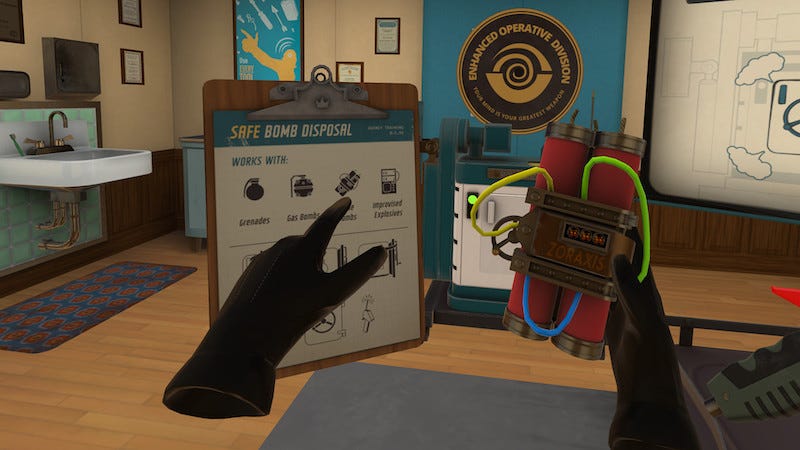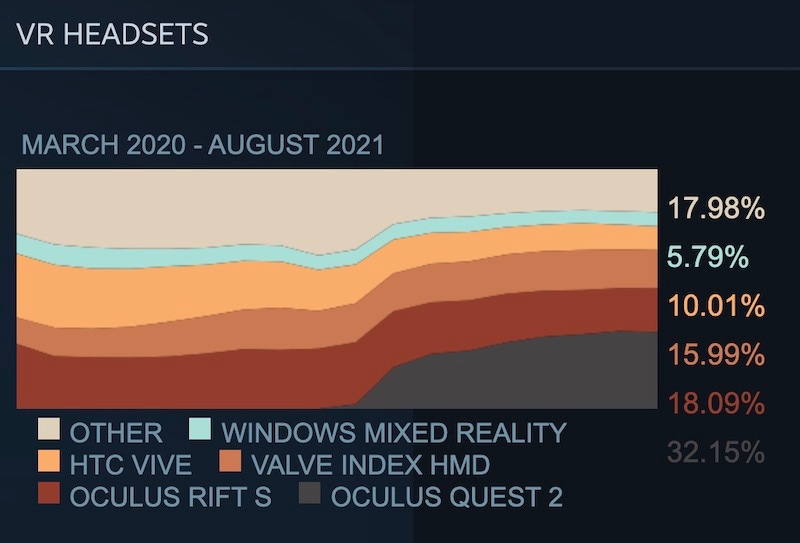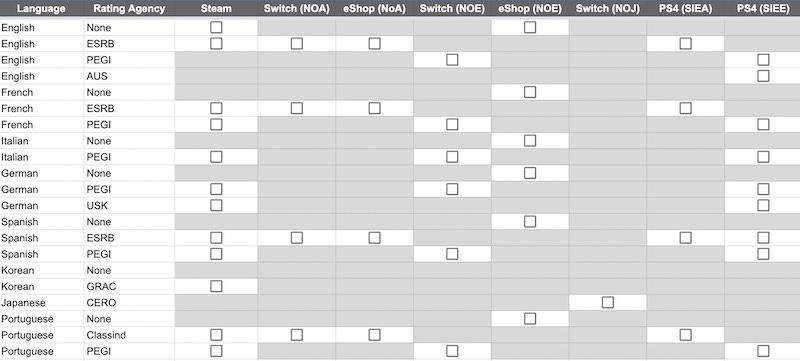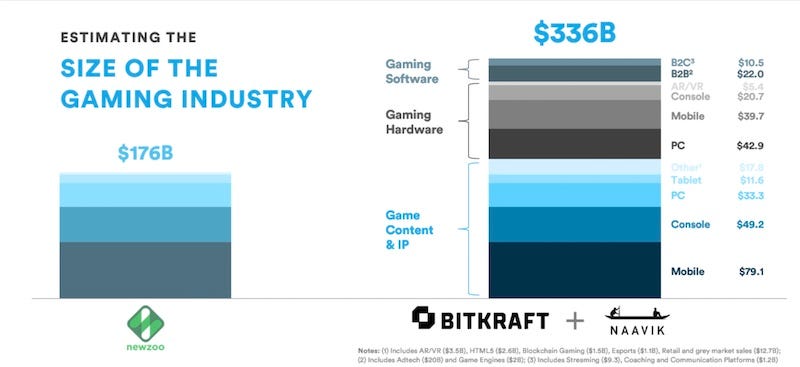VR game discovery, Reddit, trailers & more
Publikováno: 16.9.2021
Is the market finally improving for VR? And lots more...
[The GameDiscoverCo game discovery newsletter is written by ‘how people find your game’ expert & GameDiscoverCo founder Simon Carless, and is a regular look at how people discover and buy video games in the 2020s.]
Welcome to the final free GameDiscoverCo newsletter of the week. (Mucho exclusive sales/trends analysis on Friday for paid Plus subs.) But we hope you’ll dig this one. It starts out with VR - niche but seldom discussed - and moves swiftly into other areas of broader interest.
And while we’re in the intro blurb, wanted to celebrate a little newsletter milestone with you all - we made it to 8,000 free email subscribers! (And with web versions of the newsletter and GameDeveloper.com cross-posting of key articles, our reach is quite a bit bigger.) So yes, please keep recommending us to your friends, hurray.
VR games & discovery - how’s it going?
This item was prompted by Schell Games announcing that“The VR-exclusive puzzle title [I Expect You To Die 2], which followed up the 2016 original, made over $1 million in revenue in less than a week after its launch on August 24th.” And indeed, this is a big deal for VR games, which have been in the sales doldrums for any number of years.
Looking around, it appears that the game had 220 reviews on Steam 6 days after launch - so let's generously say 10,000 sales at a regionally weighted average of USD $20 average. Then there’s also Oculus Rift (16 reviews), PlayStation VR (can’t easily see review #s, guessing Rift-esque in sales sizing),and then Oculus Quest, which - whoa - has a whopping 854 reviews, at very close to 5 stars out of 5.
So, the Oculus Quest page for I Expect You To Die 2 actually had 750-ish reviews at the time Schell Games made its announcement. But even with slightly lower numbers, you can see a clear ratio here - we’d guess-timate that at least 70% of this game’s revenue was on Oculus Quest via the Oculus Store.
And then, if you look at Steam’s current VR hardware breakdown, you’ll discover that Oculus Quest 2 has quickly swelled to become over 30% of VR headsets used on Steam:
This is because there’s various ways to use the Quest 2 headset with Steam VR titles, both wired and wireless. (Perhaps 32% of the Steam purchases of I Expect You To Die 2 aren’t played on a Quest 2 headset. But I’m guessing a decent chunk are.)
So it’s clear that Oculus Quest 2 has rapidly become a big chunk of the VR market, and is shifting game discovery strategy for VR. Here’s some discovery takeaways from that:
Quest 2 being an integrated VR headset has changed the game: the fact that you boot up a standalone VR device to a menu with a slick UI, where you can easily buy games without a PC/console? VR in it feels like a real platform, not a peripheral or accoutrement where you’re distracted by non-VR games for that device. (I recently got a Quest 2, and was surprised about how different it felt.)
Being listed on the Quest Store is vital to success: yes, the Quest Store is highly curated. So this is like an ‘early Steam’ situation, where only a very limited number of games are released. I’ve heard some reports that you’ll see 50-100 sales for each review on Quest. Looking at new Quest launches, you can extrapolate that even smaller games may gross in the low hundreds of thousands of dollars over time.
Conversely, unlisted Quest apps have a big discovery issue: there are various third-party apps trying to bridge the gap here. But it seems like Quest users mainly use the Quest 2’s native store, or alternatively, connect to Steam and use SteamVR. (I don’t see a ton of big success stories from ‘sideloaded’ Quest 2 games, as you might expect.)
Unfortunately, this does create a bit of a complex discovery environment for VR. To reach the full scope of the VR market, you need to make something that works on Oculus Quest 2 - which has somewhat lower technical specs than some would prefer. But you also need an assurance from Oculus that your game will appear in their store - otherwise it’ll be a waste of time.
Looking at top-selling VR games done purely for Steam, titles like co-op action RPG Legendary Tales - just launched in Early Access a week ago - are probably a good indicator. It has 210 Mostly Positive reviews, and we’re guessing 10,000-15,000 sales at USD $30 average. So for a smaller team, that’s actually reasonable - if in the top 5% of new Steam VR launches.
But the complex 3D content required for VR is often a hefty spend compared to traditional indie games, making it more difficult to recoup. And in our view, the average VR title on Steam is probably doing 20% as well as a non-VR title, just due to installed base issues. (It’s a little tricky to quantify this, but the VR tag on Steam has a median revenue of $690, whereas the median for all tags seems to be between $2,000 and $3,000.)
And hey, in researching Legendary Tales, we discovered the following from them a year ago: “We have pitched to Oculus Quest for a second time, however we have not heard back from them…. we are a small indie company and we do not have the resources to keep working on a project without guarantee of it coming to market… so we have decided to abandon development for the oculus quest and move to PCVR.”
In this case, looks like it may work out for Legendary Tales - and who knows, they may be back on Quest later after the success of their Steam version? But the discovery situation for VR is oddly binary right now, unlike almost any other PC/console platform. And it’ll be fascinating to see how that evolves in the future…
Game devs on Reddit - a higher-level perspective
Over at the GameDiscoverCo Plus-exclusive Discord, a question came up about best practices for game devs on Reddit. And we realized that though we recently featured one example-filled item on it, we hadn’t ever seen a ‘higher-level’ view on the space, explaining from scratch.
So we went a-searching on the Internet, and found this excellent blog from 2020: ‘Grassroots Reddit marketing - a how to guide for indie devs’ from James LaPierre at Filament Games (RoboCo). We wanted to dive in and come away with a couple of takeaways:
Identifying the right subReddits is key - there’s a lot of different fiefdoms out there in Reddit-land! James says you need to identify your themes, and “…for each of these themes, your goal is to find a correspondingly relevant Reddit community. For instance… a good example of this, for RoboCo specifically, is the s***** robots subreddit. RoboCo isn’t *only* about making s***** robots, but players *can* make s***** robots if they’d like.”
Make sure you understand what is acceptable in each subReddit. As James notes: “If moderators in a community don’t like what you’re posting, you run the risk of having your post removed or even becoming banned from that subreddit – so make sure that you’re doing everything you can to stay on their good side.” And it can be complex or even blurry.
Concentrate on the visual, not the written. A great point here from Filament: “With the exception of some text-only subreddits, I really believe that video or GIF content is the best kind of content you could possibly share – and I think that’s universal across other social media sites like Twitter and Instagram! And in my experience, short videos are king – generally thirty seconds or less.”
Anyhow, the full post on the Filament Games blog has a lot more detail, and even a bunch of example posts from RoboCo, showing some of their most successful posts - appreciate them putting it out there.
(Side note: though this is Reddit-specific, it’s clear that snappy shortform visuals that encapsulate your game’s attractiveness are becoming the key to social media success in general. ‘The Internet’ is getting more and more visual, esp. for younger folks.)
PC/console game trailer checklist bingo help!
Another tick in the ‘practical help’ checkbox for today’s newsletter? The folks at publisher/dev Akupara Games (Grime, Darkside Detective) are very transparent in providing tools and info - you may remember their recent guest post on amplifying your game on console/PC platforms.
Now, Akupara has expanded on similar work from trailer ace Derek Lieu - who has a great game trailer specs page - by setting up a super helpful Google spreadsheet tfor internal purposes, which they’ve given GameDiscoverCo permission to freely share with our audience.
It covers rules regarding exactly what info - logos, ratings, intro/end slates, subtitles, etc - you need for submissions on Steam, Switch, Xbox, PlayStation, and Stadia. There are three tabs - the first with a checklist, the second with precise specifications, and the third with a pre-submission checklist for every major trailer version. (It’s quite fiddly and complex.)
Derek’s trailer guidelines page has some additional graphical info on correct logo usage and positioning, but if you’re tracking assets for a particular game, this may help you keep everything in order without freakin’ out, man. Thx again, Akupara.
The game discovery news round-up..
So we’re bringing this week’s newsletter to a close with a jaunt around various sectors of the video game discovery and platform industries. Plus a quick side trip into book publishing, because this is our newsletter, and we can link weird things if we want. Let’s go:
Here’s a good Axios piece on Xbox finally getting a handle on its quality issues with first-party titles: “Microsoft’s [good first-party game] streak may be covered in asterisks, but it’s real, and it’s meaningful to those who knew why Xbox had been selling itself based on its services, not its exclusive games. Microsoft’s solution involves buying great studios that already existed outside of Xbox, fund their best ideas and give everyone more time.”
ICYMI: Arnold at TinyTouchTales (Card Crawl, Card Thief) decided to shift his excellent premium mobile games to F2P & IAP, and has graphs/data to show what happened - largely net positive: “[Downloads] on iOS up by 280% as expected, Rev up 41%. While Card Thief is dl'ed the most, its rev declined by -1% but Card Crawls rev increased by 168%.” (Card Thief also has ads, but they make <$1k per month.)
Microlinks, Pt.1: the SNKRX dev added one more mammoth update to his ‘here’s how my game did well, transparently’ blog; interesting to see open-source console emulator RetroArch appear for free on Steam (big deal for Steam Deck? any piracy Qs?); this GameRefinery round-up of F2P mobile game trends in August is extremely encyclopaedic; apparently U.S. retailer & meme stock GameStop is “evolving from a video game retailer to a technology company that connects customers with games, entertainment and a wide assortment of products.” (?!)
This is an interesting approach to ‘the top 100 PC games’ from PC Gamer: “we're always clear that this isn't a ranking of the greatest - or most important - PC games of all time, but rather the best ones to play right now. It's a reflection of all the brilliant experiences the industry has to offer in 2021.” And there’s some older titles - Outer Wilds - mixed in with ‘hot now’ (Wildermyth, Valheim) and ‘just plain odd’ (Cruelty Squad). Good to read, if you want to remember what a great biz we work in.
The folks at Naavik (Master The Meta newsletter) teamed up with VC Bitkraft Ventures to try to better define market size for the game biz, and: “After incorporating gaming-specific hardware and software (e.g. development tools, engines, etc.) as well as complementary markets (e.g., streaming, esports, etc.), we project a more complete global market size of $335.5B in 2021—over 90% or nearly $160B higher than Newzoo’s estimate.” At the very least, check the pretty infographics (above)!
Microlinks, Pt.2: if you missed the Apple event yesterday, no worries, there wasn’t much specifically about games, give or take some Star Wars: Hunters gameplay; Jason Della Rocca has opinions on exactly when you should be pitching a game to a publisher; popular iOS/Android metrics & research site App Annie got fined by the SEC for passing confidential dev-supplied data on app downloads to stock trading firms a few years back, oops.
Nvidia has confirmed a leaked list of in-dev games for its Geforce Now cloud service is real, but claims games are ‘speculative’. It’s Schrodinger’s leak, folks. Notable for us platform followers on the ‘Sony/others doing more console to PC conversions’ front: “God of War, Returnal and Demon’s Souls for PC” were in there somewhere, as well as Crash Team Racing Nitro-Fueled.
We were browsing Xbox Game Pass the other weekend, and spotted there's now over 400 games available, including EA Play, which comes with Ultimate. Definitely feels like a ‘broadening’ phase, if you look at new announcements, with a lot of good but less high-profile titles in the process of getting added. (Maybe lots of removals are due soon, due to 12/18 month Game Pass contracts expiring?)
The MIX crew opened submissions for their next indie game virtual showcase in November - $500 fee to show if you’re selected, btw; watch out for unsolicited Discord DMs linking to games on Itch.io - there’s some Discord account-stealing going on using Itch-linked malware; what can you learn from an indie book publisher about indie game publishing? Not sure, but I enjoyed this honest/number-filled look into indie book publishing.
[We’re GameDiscoverCo, a new agency based around one simple issue: how do players find, buy and enjoy your premium PC or console game? You can subscribe to GameDiscoverCo Plus to get access to exclusive newsletters, eBook and a Discord, plus interactive daily rankings of every unreleased Steam game, and more besides.]




